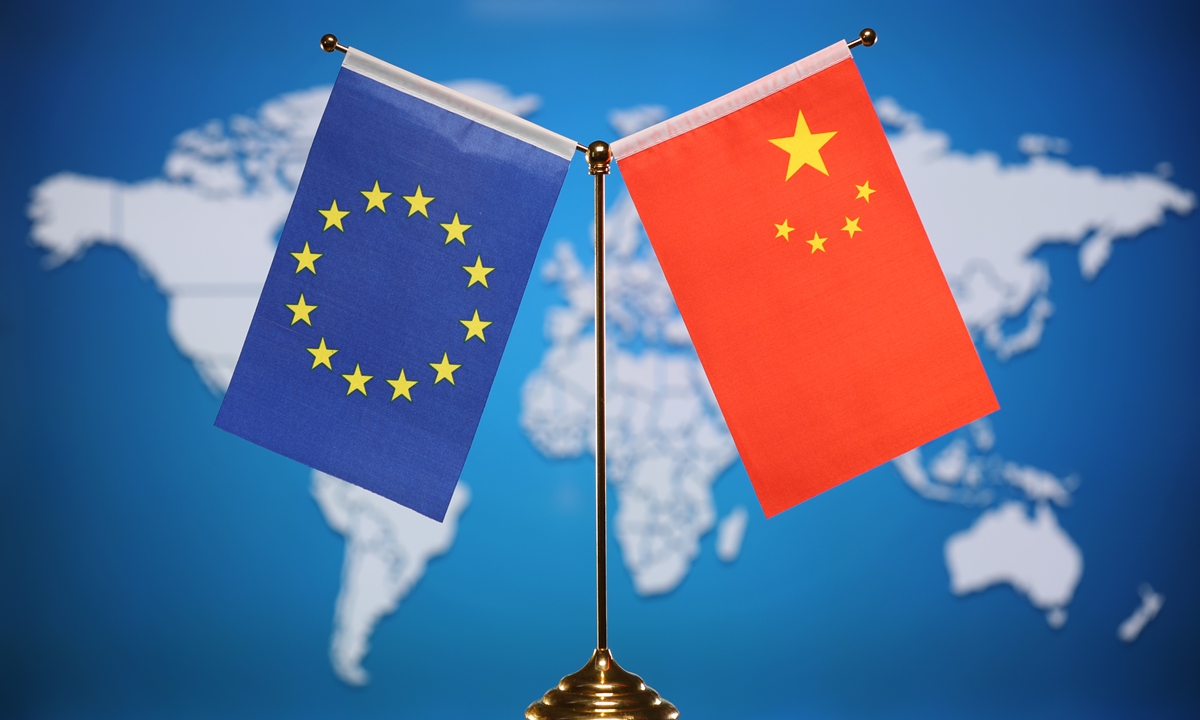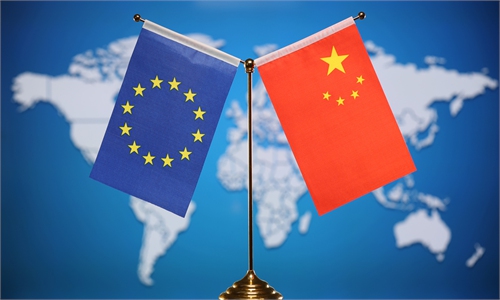Senior Chinese, European diplomats to hold strategic dialogue
Institutional engagement to inject certainty amid growing uncertainties: experts

China EU photo:VCG
As Chinese Foreign Minister Wang Yi is set to kick off his Europe trip on Monday, Chinese analysts said Sunday that this visit is expected to facilitate dialogue between China and the EU on security and economic matters, fostering greater certainty in cooperative efforts amid the growing uncertainties of the current global landscape. Moreover, high-level interactions and institutionalized dialogues will encourage Europe to adopt a more rational and comprehensive perspective toward China.
At the invitation of High Representative for Foreign Affairs and Security Policy of the EU Kaja Kallas, Federal Foreign Minister of Germany Johann Wadephul, and Minister for Europe and Foreign Affairs of France Jean-Noël Barrot, from June 30 to July 6, Wang will visit the EU headquarters and hold the 13th round of China-EU High-level Strategic Dialogue, visit Germany and hold the eighth round of China-Germany Strategic Dialogue on Diplomacy and Security, and visit France for talks with the French Foreign Minister and the meeting of the China-France high-level dialogue mechanism on people-to-people exchanges, according to a statement released by Chinese Foreign Ministry Friday.
While in Brussels, Wang Yi will meet and have talks with Belgium's Prime Minister Bart De Wever and Deputy Prime Minister and Foreign Minister Maxime Prévot respectively, said the statement.
Earlier, Chinese Foreign Ministry spokesperson Guo Jiakun stated on Friday's press conference that during the visit, Wang will exchange views with the EU side on China-EU relations and major international and regional issues, take stock of the experience in growing China-EU relations over the past 50 years, enhance understanding and mutual trust, continue to see the EU as a partner, build consensus for cooperation, properly handle disagreements and differences, and lay the political groundwork for the future interactions between Chinese and EU leaders.
For China and the EU, as major global powers and key economic players, strengthening communication reflects both sides' commitment to global responsibilities and the protection of shared interests, and also helps promote stability in global governance, Jiang Feng, professor of European Studies at Shanghai International Studies University and president of the Shanghai Association of Regional and Country Studies, told the Global Times on Sunday.
Wang Shuo, professor at the School of International Relations of Beijing Foreign Studies University, said the upcoming strategic dialogue marks the first round of communication on strategic security issues and the macro-level design of China-EU relations since the European Commission's new term began, and it will facilitate leaders' meetings and other activities around the important milestone of the 50th anniversary of China-EU diplomatic relations.
According to the Chinese Foreign Ministry, Wang Yi's visit to Germany will include co-chairing the eighth round of China-Germany Strategic Dialogue on Diplomacy and Security with Foreign Minister Johann Wadephul. Wang Yi will also exchange views with the French side on the international landscape, China-France relations, and China-EU relations.
Belgium is China's important cooperation partner in the EU. Through relevant meetings, China looks to work with Belgium to enhance understanding, broaden consensus, deepen cooperation, promote the sustained, sound, and steady growth of bilateral relations, and make new contributions to China-EU ties, said spokesperson Guo.
Regarding the countries included in this visit, Jiang said that due to the large trade volume between China and Germany, the focus will be on industrial and technological cooperation. France, on the other hand, pays more attention to addressing regional hotspot issues and enhancing its international influence. As for China-Belgium relations, the focus lies in financial and fintech cooperation, with Belgium also playing "the role of lubricant" in China-EU relations.
Wang Shuo also said the current dialogue takes place against a more complex backdrop, including the Ukraine crisis, heightened tensions in the Middle East, increased global trade protectionism, intensified competition in the green energy transition, and rising risks of technological decoupling.
The current China-EU strategic dialogue must not only address traditional security and economic issues but also focus on how to find certainty amid multiple uncertainties and promote a more balanced, stable and inclusive global governance, according to the expert.
Prior to Wang Yi's visit, China and the EU recently engaged in frequent high-level interactions, including the Sino-European Entrepreneurs Summit and the first annual governors' meeting between the People's Bank of China (PBOC) and the European Central Bank (ECB) in Beijing. Wang Yi also met with diplomatic envoys to China from the EU and its member states on Wednesday in Beijing.
During the Wednesday's meeting, the head of the EU delegation to China and diplomatic envoys of EU member states to China said China has always been an important partner for the EU. The EU is willing to work hand-in-hand with China for the future, develop a constructive, stable EU-China relationship, address global challenges, uphold multilateralism, and promote world peace and security, they said, per Xinhua News Agency.
Through frequent exchanges, Europe is better positioned to view China "more rationally and more comprehensively," Wang Shuo added.
Complex background
Ahead of Chinese Foreign Minister's visits, the EU's foreign policy chief Kaja Kallas called for a "dose of realism" in EU-China ties, in comments made to reporters on June 23 in Brussels, and accused China of employing coercive trade practices and carrying out cyberattacks against the EU, per a Reuters report.
During the G7 summit in Canada, the president of the European Commission von der Leyen warned a "new China shock" was currently underway, according to Euro News.
The EU leader has said in May that "against the backdrop of current global uncertainties and evolving geopolitical dynamics, the EU is willing to deepen its partnership with China, strengthen exchanges and cooperation, uphold the purposes and principles of the United Nations Charter, jointly tackle common challenges, and promote world peace, security, prosperity, and sustainable development."
Jiang said China-EU relations are rich and diverse, encompassing a wide range of political, economic and cultural dimensions.
Echoing Jiang, Wang Shuo said that while there are differences and competition between China and the EU, they are only part of the relationship. He warned against focusing solely on disagreements, as these risks amplifying tensions and ignoring areas of goodwill and cooperation.
Wang Shuo called for deepening communication and promoting mutual understanding through dialogue and exchange to steer China-EU relations toward greater stability, rationality, and mutual benefit
Meanwhile, the US media Bloomberg also said the visit comes amid the so-called US tariff pressure, attempting to portray normal China-EU diplomatic exchanges as actions taken under external pressure from a third party.
Wang Shuo refuted the claim, noting that it oversimplifies and misinterprets China's diplomatic motivations by reducing China-EU cooperation to a strategic move aimed at countering the US. Such a view, he argued, overlooks the deeper logic of global governance and the shared responsibilities behind the cooperation.
The expert further said that recent high-level interactions between China and the EU were not improvised responses but rather part of a prearranged diplomatic agenda, reflecting long-term planning and continuity rather than a reactive strategy to US' pressure.
On the other hand, while discussions between China and the EU do involve US-related issues, this does not mean the interactions are targeted at or centered on the US, Wang Shuo stressed.
In fact, it is the unilateral policies adopted by the US - such as tariff wars - that have compelled many countries to address US-related challenges in bilateral or multilateral dialogues. Particularly since the current US administration, these policies have directly or indirectly affected global economic rules and order, making such discussions between China and the EU both natural and necessary, the expert said.
Chinese Foreign Ministry spokesperson Lin Jian stated on May 6, the day marking the 50th anniversary of the establishment of diplomatic ties between China and the EU, that the most valuable experience of the 50-year history of China-EU relations is mutual respect and seeking common ground while shelving differences.
"China and the EU have different histories, cultures and systems, but as long as both sides respect each other's development path and social system chosen by their people, seek common ground, and set aside and overcome differences whenever possible, we can always achieve common progress, win-win results and mutual success through mutual learning and open cooperation," said Lin.

